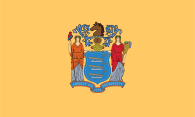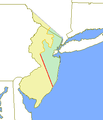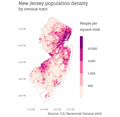The New Jersey Portal New Jersey is a state situated within both the Mid-Atlantic and Northeastern regions of the United States. It is the most densely populated of all 50 U.S. states, and is situated at the center of the Northeast megalopolis. New Jersey is bordered on its north and east by New York state; on its east, southeast, and south by the Atlantic Ocean; on its west by the Delaware River and Pennsylvania; and on its southwest by Delaware Bay and Delaware. At 7,354 square miles (19,050 km2), New Jersey is the fifth-smallest state in land area, but with close to 9.3 million residents as of the 2020 United States census, its highest decennial count ever, it ranks 11th in population. The state capital is Trenton, and the state's most populous city is Newark. New Jersey is the only U.S. state in which every county is deemed urban by the U.S. Census Bureau with 13 counties included in the New York metropolitan area, seven counties in the Philadelphia metropolitan area, and Warren County part of the heavily industrialized Lehigh Valley metropolitan area. New Jersey was first inhabited by Paleo-Indians as early as 13,000 B.C.E., with the Lenape being the dominant Indigenous group when Europeans arrived in the early 17th century. Dutch and Swedish colonists founded the first European settlements in the state, with the British later seizing control of the region and establishing the Province of New Jersey, named after the largest of the Channel Islands. The colony's fertile lands and relative religious tolerance drew a large and diverse population. New Jersey was among the Thirteen Colonies that supported the American Revolution, hosting several pivotal battles and military commands in the American Revolutionary War. On December 18, 1787, New Jersey became the third state to ratify the United States Constitution, which granted it admission to the Union, and it was the first state to ratify the U.S. Bill of Rights on November 20, 1789. (Full article...) Selected article -
The Battle of Trenton took place on the morning of December 26, 1776, during the American Revolutionary War, after General George Washington's crossing of the Delaware River north of Trenton, New Jersey. The hazardous crossing in adverse weather made it possible for Washington to lead the main body of the Continental Army against Hessian soldiers garrisoned at Trenton. After a brief battle, nearly the entire Hessian force was captured, with negligible losses to the Americans. The battle significantly boosted the Continental Army's flagging morale, and inspired re-enlistments.
The Continental Army had previously suffered several defeats in New York and had been forced to retreat through New Jersey to Pennsylvania. Morale in the army was low; to end the year on a positive note, George Washington—Commander-in-Chief of the Continental Army—devised a plan to cross the Delaware River on the night of December 25–26 and surround the Hessian garrison the next morning. Because the river was icy and the weather severe, the crossing proved dangerous. Two detachments were unable to cross the river, leaving Washington and the 2,400 men under his command alone in the assault. The army marched 9 miles (14 km) south to Trenton. The Hessians had lowered their guard, thinking they were safe from the American army, and did not post a dawn sentry. Washington's forces caught them off guard and, before the Hessians could resist, they were taken prisoner. Almost two thirds of the 1,500-man garrison was captured, and only a few troops escaped across Assunpink Creek. Despite the battle's small numbers, the American victory inspired rebels in the colonies. With the success of the revolution in doubt a week earlier, the army had seemed on the verge of collapse. The dramatic victory inspired soldiers to serve longer and attracted new recruits to the ranks. Selected picture - Credit: Chin tin tin Atlantic City is a coastal city in Atlantic County, known for its legalized gambling, and for inspiring the game Monopoly. New Jersey news'Related portalsSelected biography -Sheila Yvette Oliver (July 14, 1952 – August 1, 2023) was an American politician who served as the second lieutenant governor of New Jersey from 2018 until her death in 2023. A member of the Democratic Party, Oliver was the first Black woman to serve as lieutenant governor of New Jersey and was the first woman of color elected to statewide office in New Jersey. In the 1990s, Oliver served on the Board of Education of the East Orange School District, ultimately serving as the district's president. Oliver represented the 34th legislative district in the New Jersey General Assembly from 2004 to 2018, serving as speaker of the body from 2010 to 2014. Oliver was the first Black woman to serve as speaker of the General Assembly and the second Black woman in the history of the United States to lead a state legislative body. She ran for U.S. Senate in a 2013 special election, finishing fourth in a Democratic primary that was won by Cory Booker. (Full article...)Did you know? -
General imagesThe following are images from various New Jersey-related articles on Wikipedia.
TopicsQuality content
CategoriesThings you can do
For more information on how you can help, see the WikiProject New Jersey. Associated WikimediaThe following Wikimedia Foundation sister projects provide more on this subject:
Discover Wikipedia using portals |

Sons of Union Veterans of the Civil War












































































